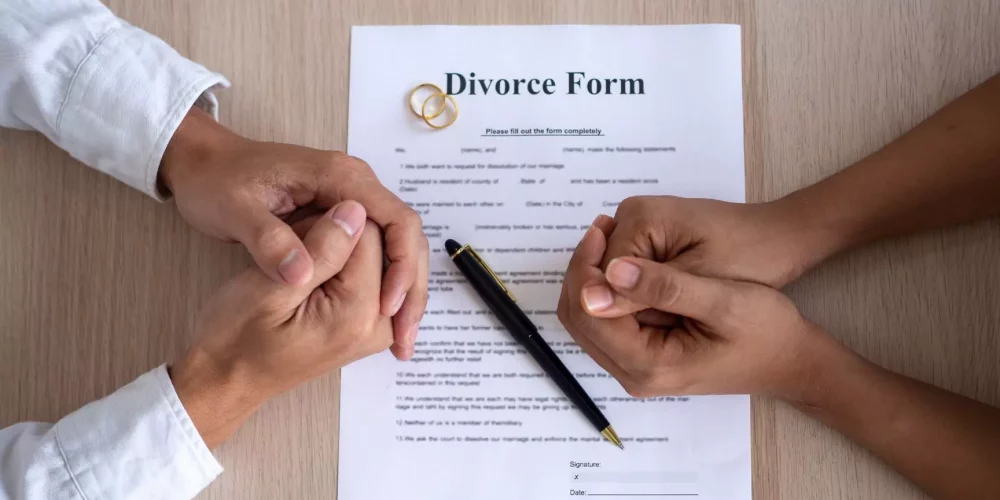Are you considering a divorce in Colorado but dreading the lengthy and costly court battles?
An uncontested divorce in Colorado might be the solution you’re looking for.
This comprehensive guide will walk you through the process, requirements, and benefits of an uncontested divorce in Colorado, helping you navigate this challenging and emotional journey with ease and confidence.

Short Summary
- Uncontested divorce in Colorado requires agreement on all major issues, meeting residency requirements, and filing paperwork.
- Navigating child custody and support involves creating a parenting plan and calculating child support based on both parents’ income.
- Property and debt division is determined by factors such as the financial situation of each spouse and contributions made to the marriage.
- Legal assistance can help ensure one’s interests are protected during an uncontested divorce.
Understanding Uncontested Divorce in Colorado
Uncontested divorce in Colorado is a more straightforward and affordable option for couples who can agree on all major issues related to their divorce, such as property division, child custody, and support.
However, be aware that property and business valuations may still be required.
Unlike contested divorces, where couples have disagreements that must be resolved in court, uncontested divorces allow couples to settle their differences amicably and avoid lengthy court hearings.
This not only saves time and money but also helps preserve a healthy relationship between the separating spouses, especially when children are involved.

The outcome of an uncontested divorce is the issuance of a final divorce decree by a judge.
In some cases, you can achieve this without a court appearance, provided you meet certain conditions such as having a signed Separation Agreement and either having no minor children or a Parenting Plan created with legal representation on both sides.
However, we still recommend consulting with an experienced divorce attorney to ensure the protection of your rights and interests throughout the process.
Eligibility Criteria for Uncontested Divorce
In Colorado, all divorces are “no-fault,” which means neither party must say the other did something wrong.
At least one of the parties must meet residency requirements and reach a consensus on all major issues related to their divorce to qualify for an uncontested divorce.

At least one of the parties must meet residency requirements and reach a consensus on all major issues related to their divorce to qualify for an uncontested divorce.
The following subsections will delve into the specifics of these residency requirements and the major issues requiring agreement.
Residency requirements vary from state to state, but in Colorado, one of the spouses must meet the Colorado law requirement, which is residing here for 91 days before filing the Petition for Dissolution.
Residency Requirements
To file for divorce in Colorado, at least one of the spouses must have been a Colorado resident for 91 days prior.
Residency for such a period is a requirement for divorce.
The residency requirement ensures that Colorado courts have jurisdiction over your case.
This ensures that any dispute or disagreement can be handled properly.
Agreement on Major Issues
For an uncontested divorce in Colorado, couples must reach a mutual agreement on the following matters:
- Property division
- Debt division
- Child custody arrangements
- Child support
- Spousal support (if applicable)
Filing Process for Uncontested Divorce in Colorado
The filing process for an uncontested divorce in Colorado involves:
- Preparing and submitting divorce paperwork
- Serving your spouse or filing a “Co-Petition”
- Obtaining the final Decree
In the following subsections, we’ll provide a detailed explanation of each step.
Preparing and Submitting Paperwork

Couples initiating an uncontested divorce in Colorado must fill out and submit the necessary divorce forms.
These include the petition for dissolution of marriage or legal separation and the summons for dissolution of marriage or legal separation.
You or your spouse can obtain these forms from the county district court where you reside.
Once you complete them, you must submit the petition and other required documents to the Clerk’s Office of the District Court in your county of residence, along with the applicable fees.
Although you can find these forms online, consulting an attorney to ensure the paperwork is completed correctly and meets all legal requirements is always wise.
Serving Your Spouse
If you are the petitioner (the one who initiates the divorce), and you do not file a “Co-Petition,” you must serve your spouse with the divorce papers.
This is known as “serving” papers and demonstrates to the court that your spouse has received them.
You have a few options for serving the papers:
- Request your spouse to sign a “waiver of service” form to avoid formal service
- Have the county sheriff serve the papers
- Use a professional process server to ensure proper delivery of divorce papers
After serving your spouse, the next step is to submit the divorce forms to the court.
Alternatively, both parties can file as co-petitioners and skip the serving process, as both are involved in initiating the divorce.
Obtaining the Final Decree
Couples can obtain a final divorce decree without a court hearing if they meet certain requirements.
If there are children, both parties must have an attorney in order to avoid going to court for entry of the Decree.
If the parties have a signed Separation Agreement and no children, they can be divorced without a court appearance.
The final Decree marks the official end of the marriage and the beginning of a new chapter in each spouse’s life.
Navigating Child Custody and Support in Uncontested Divorce

In an uncontested divorce in Colorado, navigating child custody issues and support requires creating a parenting plan and calculating child support based on both parent’s income and other relevant factors.
Let’s explore these aspects in more detail.
Creating a Parenting Plan
A parenting plan is a crucial document that outlines the rights and responsibilities of each parent in relation to their child.
It ensures parents understand their rights and obligations and prioritizes the child’s best interests.
A comprehensive parenting plan should include provisions for the following:
- Decision-making
- Visitation schedules
- Child support
- Holidays
- Vacations
- Other special occasions
Establishing a parenting plan requires discussing the issues with your spouse and reaching a consensus on how to handle them effectively.
If you cannot reach an agreement, you may need to seek the help of a mediator or other specialist.
Once you create a parenting plan, the court must review it to ensure it meets the child’s best interests and complies with the state’s legal requirements.
Calculating Child Support
In Colorado, one parent may owe the other parent financial support to assist in raising the child.
The state uses a formula to determine child support.
The formula considers both parents’ gross income, the number of overnights each parent spends with the child, and any extraordinary expenses related to the child.
The Colorado Child Support Calculator is an online tool that can help you estimate your monthly child support payments.
When you input both parents’ income and other relevant information into the calculator, it provides an estimate of potential child support payments to meet the child’s financial needs.
Property and Debt Division in Uncontested Divorce
Property and debt division in an uncontested divorce should be fair and equitable, taking into account factors such as the financial situation of each spouse, the duration of the marriage, and contributions made by each spouse, including homemaking and child care.
Colorado follows the principle of equitable division, which allocates property fairly, though not necessarily in equal proportions.
Colorado courts generally favor a 50/50 split when dividing marital property but may use different proportions in allocating property depending on the circumstances of your case.
In property division, all marital debts are taken into consideration as well.
The Role of Mediation in Uncontested Divorce

Mediation can play a crucial role in resolving disagreements and reaching a mutually acceptable agreement in an uncontested divorce, helping couples avoid costly and time-consuming litigation.
In uncontested divorce cases in Colorado, mediation services can assist spouses in finalizing the terms of their separation by working with trained mediators to resolve disputes and reach agreements on matters like property division, child custody, and support.
By engaging in mediation, couples can save time, money, and preserve their family’s well-being by avoiding going to court.
Mediation also fosters better communication between the spouses, which can be particularly beneficial when children are involved, as it helps maintain a more amicable relationship between the parents.
Legal Assistance for Uncontested Divorce
While it is possible to file for divorce and have the case be “uncontested” without legal assistance, consulting with an attorney can help ensure that the separation agreement and other documents meet court requirements and protect your interests.
An experienced divorce attorney can:
- Guide you through the divorce process
- Provide invaluable advice
- Ensure you complete the paperwork correctly
- Ensure that all legal regulations are adhered to
To find a reputable divorce attorney in Colorado, seek referrals from trusted individuals, contact your local bar association, or research online for lawyer ratings and reviews.
Engaging a divorce lawyer for your uncontested divorce can protect your rights and interests throughout the process, giving you peace of mind and confidence.
Summary
In conclusion, an uncontested divorce in Colorado offers a more amicable, cost-effective, and time-saving option for couples who can agree on all major issues related to their divorce.
By meeting residency requirements, creating a parenting plan, calculating child support, and dividing property equitably, couples can successfully navigate the divorce process with minimal stress and disruption.
Don’t hesitate to seek the help of an experienced Denver divorce lawyer like Laura E. Shapiro and consider mediation services to ensure a smoother transition for your family.
Frequently Asked Questions
How long does it take to get an uncontested divorce in Colorado?
Uncontested divorces in Colorado can be finalized in as little as 91 days if both parties promptly agree to the terms and file necessary affidavits.
However, settlement negotiations or delays in document submissions may extend the process up to six months.
Do I have to go to court for an uncontested divorce in Colorado?
In Colorado, you can be granted an uncontested divorce without appearing in court for a hearing if you submit an affidavit.
This is known as a “decree upon affidavit” and can make the process more convenient for both partners.
What is the easiest way to get a divorce in Colorado?
In Colorado, the quickest and easiest way to get a divorce is by filing an affidavit for a “decree upon affidavit,” which may result in the court granting the divorce without needing to go through a hearing.
This process is relatively simple and straightforward and can be completed without a lawyer or other legal representation.
However, it is advised to seek the counsel of an experienced attorney.
The affidavit must be filed with the court, and the court will then review the affidavit and determine whether or not to grant the divorce.
What is the main difference between contested and uncontested divorce in Colorado?
Contested divorces involve disagreements that need to be resolved in court, whereas uncontested divorces occur when both parties agree on all matters relating to the divorce.
What are the residency requirements for an uncontested divorce in Colorado?
In order to file for an uncontested divorce in Colorado, one of the spouses must have been a resident of the state for at least 91 days prior to filing.
